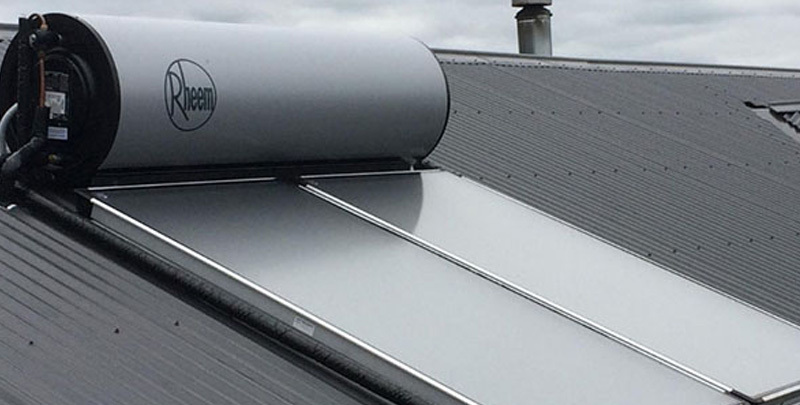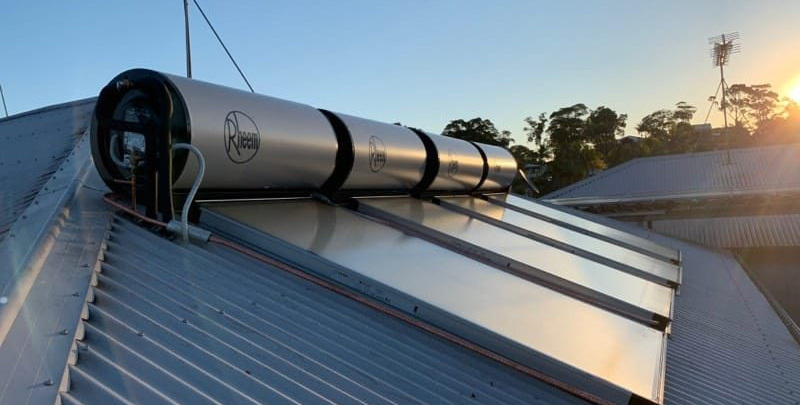Pros and Cons of Using Solar Hot Water Systems

As the world pivots towards sustainable energy solutions, solar hot water systems have emerged as a frontrunner in environmentally conscious home technologies.
Harnessing the sun’s power to provide a renewable source of hot water, these systems offer both eco-friendly benefits and potential drawbacks.
In exploring the pros and cons of solar hot water systems, we delve into the advantages that make them an attractive choice for homeowners seeking energy efficiency.
What are Solar Hot Water Systems?
Solar hot water systems harness the sun’s power to provide an eco-friendly and cost-effective solution for heating water. Before diving into these systems’ pros and cons, understanding their basic principles is essential.
Solar hot water systems use solar collectors, typically mounted on rooftops, to capture sunlight and convert it into usable heat for household water. The system stores this heat in a well-insulated tank for later use. Such systems are a significant step towards reducing your carbon footprint and energy costs. However, there are both advantages and disadvantages that you should be aware of before investing.
Pros of Solar Hot Water Systems
Solar hot water systems offer a sustainable and cost-effective solution for meeting your hot water needs. By harnessing the power of sunlight, these systems can significantly reduce energy bills and lower your carbon footprint.
1. Cost Savings
Solar hot water systems offer substantial cost savings over time. You can significantly reduce your water heating bills by harnessing free energy from the sun. The initial installation cost can be intimidating, but the long-term financial benefits are undeniable. Solar hot water systems can save homeowners between 50% and 80% on their water heating expenses. It means more money in your pocket and a smaller environmental impact.
2. Environmental Benefits
Reducing your carbon footprint is one of the most compelling advantages of solar hot water systems. By utilising the sun’s energy, you’re decreasing your reliance on fossil fuels, significant contributors to greenhouse gas emissions. Solar water heaters are a green and sustainable alternative, aligning with the global shift towards cleaner energy sources. Additionally, they reduce your dependence on traditional energy grids, making you less vulnerable to energy price fluctuations.
3. Energy Independence
Solar hot water systems promote energy independence. You can generate your hot water instead of relying solely on utility companies. It means you’re less affected by power outages and price hikes, giving you greater control over your energy usage and costs.
4. Low Operating Costs
One of the often-overlooked benefits of solar hot water systems is their minimal operating costs. They require relatively low maintenance, with occasional inspections and cleanings to ensure optimal performance. Solar systems are a cost-effective choice in the long run compared to traditional water heating systems, which can incur significant repair and energy expenses.
5. Government Incentives
Many governments offer incentives to encourage the adoption of solar hot water systems. These incentives can include tax credits, rebates, and grants. To make the most of these programs, it’s essential to research and understand what is available in your region. By taking advantage of these incentives, you can significantly offset the initial investment and enjoy quicker returns on your system.

Cons of Solar Hot Water Systems
Even something as positive and long-lasting as a solar hot water system has its drawbacks. Let’s look at some of the disadvantages of buying and using a solar water heater.
1. High Initial Costs
The primary drawback of solar hot water systems is the initial installation cost. While they pay for themselves in the long run, the upfront expenses can be substantial. To mitigate these costs, you may explore financing options, government incentives, or leasing arrangements to make the investment more manageable.
2. Weather Dependence
Solar hot water systems rely on sunlight to operate efficiently. Cloudy days, seasonal variations, and local weather patterns can affect their performance. To cope with this dependence on weather conditions, some homeowners opt for more extensive storage tanks or auxiliary heating methods for backup during cloudy days or extended periods of inclement weather.
3. Space Requirements
Solar collectors and storage tanks require space for installation. The physical footprint of these systems can be a challenge for homes with limited rooftop or yard space. Consider creative installation methods, such as vertical or ground-mounted collectors or compact storage tank designs, to address space limitations.
4. Backup System Necessity
Solar hot water systems may require a backup water heating system, especially in regions with inconsistent sunlight. A backup ensures you always have hot water available, even when your solar system is not operating at total capacity. While this adds an extra cost, it provides peace of mind and convenience.
5. Installation Challenges
The installation process of solar hot water systems can be complex. Finding a reputable and experienced installer is crucial to ensure a smooth and efficient setup. Challenges such as roofing or plumbing modifications may arise, which can extend the installation timeline and costs. Thoroughly researching and selecting the right installer is vital to a successful installation.

Sustainability of Solar Hot Water Systems
In conclusion, solar hot water systems offer several compelling advantages, including cost savings, reduced environmental impact, energy independence, low operating costs, and government incentives.
However, it’s essential to consider the drawbacks, such as high initial costs, weather dependence, space requirements, the necessity for a backup system, and potential installation challenges. Before deciding, weigh these pros and cons carefully to determine if a solar hot water system is the right choice for your home.
While solar hot water systems are not without their challenges, they are a sustainable and cost-effective solution for many households. By understanding their advantages and disadvantages, you can make an informed decision aligning with your energy and environmental goals.
Remember that each home is unique, so consult with professionals and explore your options before embarking on your solar hot water system journey.
Please note: This information is provided for advice purposes only. Regulations differ from state to state, so please consult your local authorities or an industry professional before proceeding with any work. See our Terms & Conditions here.